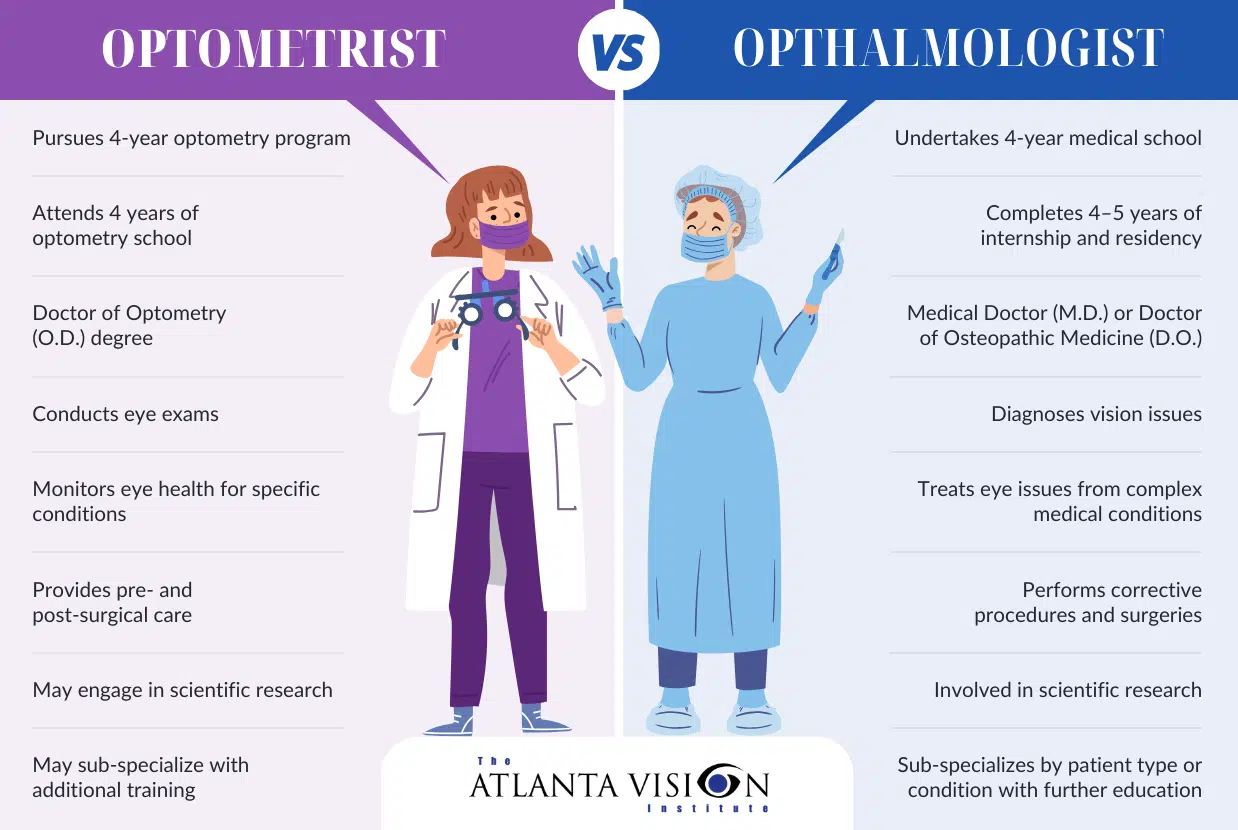Choosing the right eye care professional is crucial for maintaining optimal vision and eye health. With various types of eye doctors available, you may be unsure which one will best meet your specific needs. Understanding the different types of eye doctors will help you decide if you need to see an ophthalmologist or an optometrist.
Ophthalmologists: Masters of Surgical Expertise
Ophthalmologists are medical doctors who specialize in the diagnosis, treatment, and management of eye diseases and disorders. They undergo extensive medical training, including four years of medical school followed by a residency program focused specifically on ophthalmology. Their extensive level of education qualifies them to provide a wide range of eye care services, including routine eye exams and complex surgical procedures.
Do Ophthalmologists Perform LASIK Surgery?
Ophthalmologists have specialized training in eye surgery, including LASIK (laser-assisted in situ keratomileusis). LASIK is a popular surgical solution that aims to correct refractive errors such as nearsightedness, farsightedness, and astigmatism. In addition to performing the surgery, ophthalmologists also play a pivotal role in assessing the patient’s candidacy for the procedure and providing post-operative care. When considering this procedure, it’s important to seek out the best LASIK surgeon in Atlanta to ensure optimal results and care.
Optometrists: Guardians of Comprehensive Eye Care
Optometrists are healthcare professionals specializing in comprehensive eye care services, focusing on vision testing and the prescription of corrective lenses. They also diagnose and manage common eye conditions. While optometrists also undergo rigorous training — including a doctoral-level optometry program — their scope of practice differs from that of ophthalmologists.
In essence, optometrists serve as frontline providers of eye care, addressing a wide range of visual and ocular health needs for patients of all ages. They work closely with ophthalmologists to ensure continuity of care and facilitate timely referrals for specialized treatment when necessary. This includes referrals to Atlanta LASIK specialists for patients seeking corrective vision surgery.
Understanding the Differences Between Ophthalmologists and Optometrists
One of the primary distinctions between ophthalmologists and optometrists lies in their ability to perform surgical interventions. As previously mentioned, ophthalmologists are trained to perform a variety of surgical procedures. Their surgical repertoire ranges from minor interventions, like eyelid surgery, to more complex surgeries such as cataract removal and LASIK surgery. These procedures may be necessary to treat conditions like glaucoma, retinal detachment, and corneal disorders, among others.
Unlike ophthalmologists, optometrists do not perform surgical procedures. Instead, they focus on preventive care, early detection of eye diseases, and non-invasive treatment modalities. Optometrists are responsible for conducting comprehensive eye exams, assessing visual acuity, prescribing eyeglasses and contact lenses, and managing conditions such as dry eye syndrome, glaucoma, and diabetic retinopathy.

How the Different Types of Eye Doctors for Comprehensive Care
Ophthalmologists and optometrists often collaborate to provide a full spectrum of eye care, ensuring patients receive the most comprehensive treatment. Patients may benefit from the combined expertise of both ophthalmologists and optometrists, particularly in cases requiring multidisciplinary care or co-management of complex eye conditions. By working together, these professionals ensure that patients receive personalized, high-quality care tailored to their individual needs and preferences.
Co-Management of Surgical Patients
A patient undergoing eye surgery may receive pre-operative evaluations and post-operative care from an optometrist, while the surgical intervention itself is performed by an ophthalmologist. This collaborative approach ensures that patients receive the highest standard of care at every stage of their treatment journey.
Shared Care for Chronic Conditions
Patients with chronic eye conditions like glaucoma, diabetic retinopathy, or macular degeneration may receive care from both professionals. The ophthalmologist might manage the medical or surgical treatment of the condition, while the optometrist monitors the patient’s vision and adjusts vision correction as needed.
Referrals
Optometrists may refer patients to ophthalmologists for further evaluation and treatment of advanced eye diseases, conditions requiring surgery, or when a condition is outside their scope of practice. Conversely, ophthalmologists may refer patients back to optometrists for routine vision care or management of chronic conditions like glaucoma, after the initial treatment phase.
Considering LASIK? Choose Atlanta’s Best Ophthalmologist
Understanding the roles of ophthalmologists and optometrists is crucial for making informed decisions about eye care and treatment options. Whether seeking treatment for a specific eye condition or undergoing routine eye exams, patients can trust in the expertise and dedication of both ophthalmologists and optometrists to safeguard their vision and promote lifelong eye health.
If you’re ready to take the next step towards clearer vision and a brighter future, connect with the Atlanta Vision Institute today to schedule a free virtual consultation. Visit us at atlanta2020.com or call (678) 902-8338 to learn more about our award-winning LASIK eye surgery and take the first step towards clearer vision today!

Please Take Our LASIK or Cataract Surgery Quiz
Take our vision quiz to find out if you qualify for LASIK or cataract surgery!


